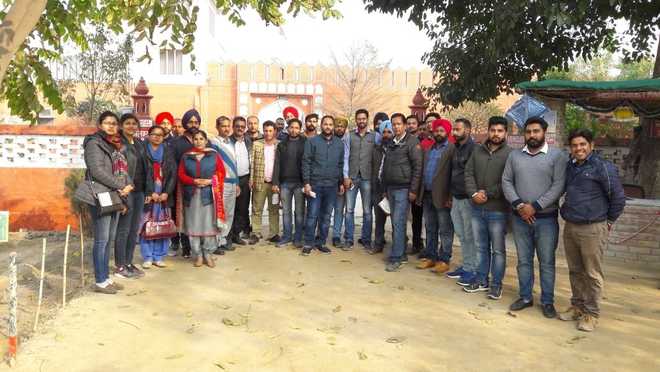Three-day agro tourism programme ends
Ludhiana: Punjab Agricultural Management & Extension Training Institute (PAMETI), PAU Campus, Ludhiana, organised a three-day training programme on ‘Agro-Tourism for Better Profitability’ from January 17 to January 19.
The programme was for the benefit of extension functionaries from State Agriculture and Allied Departments and ATMA staff in which 29 officials participated.
Rupinder Kaur, Deputy Director – HRM and programme coordinator, revealed that Agro-tourism or Eco-tourism is a new and innovative face of agricultural activity related to tourism and agriculture both. Agriculture is the most important sector of economy of the state. But today it is becoming less remunerative due to uncertainty of weather, prices fluctuations of agro-products and some other reasons. Hence, there is a need to do such innovative activities in agriculture, which will help the farmers and our economy.
“To experience the real rural life, one must taste the local traditional food and get familiar with our old age culture and heritage. ‘Agro-tourism’ has a great potential to create another income-generating venture for the farmers of the state,” she added.
Dr PS Sivakumar, Senior Scientist, Extension and Social Sciences, Central Tuber Crops Research Institute (CTCRI), Kerala, interacted with the participants through video-conferencing session and discussed about agro-tourism. Nalin Rai from NABARD, Bengaluru, also interacted through video-conferencing and discussed about financing options available if any farmer wants to start an agri-tourism venture.
Dr Manmeet Kaur from the Department of Extension Education, PAU, enlightened the participants about agro-tourism policy and regulations.
Kisan melas to start from March 8
The university has released the dates for the seven Kisan melas, to be held in March 2018 in different parts of Punjab. The series of the Kisan Melas will begin with the first mela at Ballowal Saunkhri on March 6 followed by that at Nag kalan Jahangir (Amritsar) and at Faridkot on March 8. The Kisan Melas at Gurdaspur and Rauni (Patiala) will be organised on March 14 and 19, respectively. The Kisan Mela at PAU, Ludhiana, is scheduled for March 23 and 24, whereas at Bathinda, it is slated for March 27. Dr Ashok Kumar, Director of Extension Education, PAU, said these melas were a big attraction for the farmers, rural women and the rural youth. These melas provide a platform to the participating farmers and the rural women to learn about new crop varieties, technologies and household activities, he added. The farmers can discuss their farm problems with the PAU experts, seek solutions for the same, purchase quality seed and farm literature, and participate in crop produce competition, he said.
Beekeeping training course concludes
A five-day beekeeping training course, organised by the Department of Entomology, PAU, for the scheduled castes at village Hassanpur in district Ludhiana, concluded on Friday. The course was held under the aegis of Rashtriya Krishi Vikas Yojna. Dr Pardeep K Chhuneja, Course Coordinator and Head, Department of Entomology, said the training course would go a long way in giving economic benefits to the unemployed rural youth through the adoption of beekeeping as an enterprise. This would pave way for rural prosperity, he added. During the course, practical hands-on experience was provided on various aspects such as bee husbandry during different seasons; production and post-harvest handling of honey; processing and marketing of honey; colonies multiplication, and management of bee enemies and diseases. The trainees were also apprised of the finance facilities and subsidy schemes available for beekeeping. — TNS










